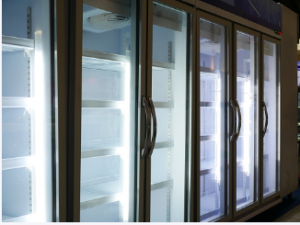Refrigeration systems are essential for businesses that must safely store food, beverages and other products. Hospitals and research clinics also rely on these systems to preserve sensitive material.
 Commercial refrigeration Melbourne systems transfer heat from food and beverages stored inside to refrigerated solutions. The second law of thermodynamics states that heat travels from more excellent objects to warmer ones when they come together close enough. More info here coldlogic.com.au/commercial-refrigeration-melbourne.
Commercial refrigeration Melbourne systems transfer heat from food and beverages stored inside to refrigerated solutions. The second law of thermodynamics states that heat travels from more excellent objects to warmer ones when they come together close enough. More info here coldlogic.com.au/commercial-refrigeration-melbourne.
Walk-in coolers
Walk-in coolers are economical and reliable commercial refrigeration for food storage and other products. Ranging in size, walk-in coolers can be utilised by businesses ranging from restaurants to warehouses.
Refrigerated storage solutions can also provide companies with an ideal way to store frozen goods or keep items at a specific temperature for an extended period – for instance, and a brewery might need to hold ample beer before selling it to customers.
Temperature control systems in walk-in coolers are of critical importance. Most systems utilise thermostatic controls and compressors to keep temperatures consistent in the unit.
Maintain a regular cleaning schedule to protect your walk-in from bacteria growth. It will help avoid unpleasant odours forming within the space and protect its inhabitants from diseases that could arise.
An effective way to maintain cleanliness in a walk-in cooler is using cleaning solutions designed for this task, such as those manufactured by many manufacturers that are eco-friendly and easy to use.
Temperature control is also essential. An excessively cold or warm cooler could damage your products quickly and cause them to go bad more rapidly than necessary.
Undercounter refrigerators
Undercounter refrigerators are ideal for small restaurants and businesses without enough room to accommodate full-sized fridges and also work excellently in smaller apartments where they save space. More info here coldlogic.com.au/commercial-refrigeration-melbourne.
Undercounter refrigerators offer an ideal alternative to mini fridges, yet installation can sometimes prove challenging. As these taller units require leaving space between them to fit under your counter seamlessly, this may prove challenging in specific locations.
Back bar coolers
Back bar coolers are essential equipment in any restaurant or bar that serves beverages, keeping alcoholic drinks cool and other items, such as glassware and food ingredients, at an ideal temperature for freshness.
When purchasing a commercial back bar cooler, consider several vital considerations, including size, capacity and configuration. In addition, when selecting one, pay special attention to door type, top type, and exterior finish options.
One popular choice is a glass door refrigerator model, which allows customers to quickly see your products at a glance and showcase your drink selection. But you may prefer solid doors for a more straightforward appearance that coordinates better with existing bar refrigerators.
Additional options for single, double and triple door models in stainless steel or black may also fit your bar’s aesthetic. Glass door models with LED lighting may draw customer interest to your beverages and help increase sales.
Back bar coolers are essential to any bar layout and must meet all required size, capacity and configuration criteria to efficiently accommodate serving drinks and handling heavy traffic volumes.
Most back bar coolers feature a compressor on the left side to maintain ideal temperatures; however, certain manufacturers allow users to customise this setting according to their bar layout and flow.
Deli cases
Deli cases are refrigerated display cabinets designed to display deli meats and cheeses appealingly. Featuring multiple shelves for storage purposes, these cases come in full-service models, open-air self-service models or pass-thru models for maximum versatility.
These cabinets come in several finishes, such as stainless steel or laminate. Stainless is generally more costly but less likely to get dented or scratched, while black or white laminate can be painted to protect it against rusting.
There are two primary cooling types for deli cases: forced air and gravity coil. Forced air utilises fans to circulate cold air, while gravity coil systems use refrigeration coils that deliver cool air into your cabinet. Each method offers different advantages and disadvantages, so deciding which will best meet your needs is essential.
Gravity coil units tend not to dry out foods over extended exposure, making them more affordable than their forced air counterparts.
Some deli cases are also equipped with LED lights to enhance product visibility and presentation, as well as to save energy costs and cut electricity consumption. They’re great additions for grocery stores, convenience stores and cafes to increase sales, profits and customer attraction at food service establishments.

